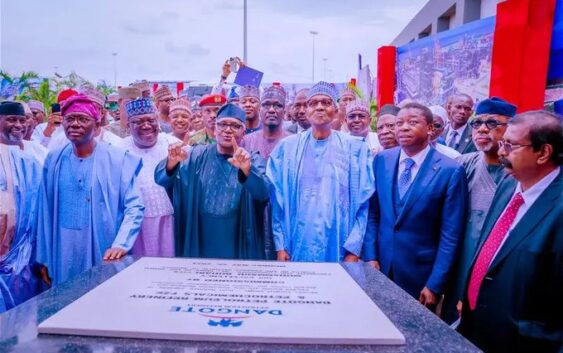- ALGERIA MINISTER RECIEVED HARBOR ENERGY CEO OVER ENERGY PARTNERSHIP
- CAN INNOVATION OUTRUN DROUGTH IN MOROCCO ONGOING WATER MANAGEMENT CRISIS
- SCZONE SIGNED DEAL WITH CHINESE INVESTORS FOR IRON PRODUCTS PROJECTS IN EGYPT
- WESTPROP HOLDING LIMITED SET TO EMBARKED ON PIPELINE PROJECT IN ZIMBABWE
- FORMER TOGO PLAYER ADEBAYOR LAUNCH SOCIAL HOUSING PROJECT IN TOGO
HOW WOULD NIGERIAN BENEFIT AFTER DANGOTE REFINERY COMMISSIONING

President Muhammadu Buhari launched the Dangote Petroleum Refinery and Petrochemicals Complex, Africa’s largest petrochemical refinery, and the world’s largest single-train petroleum refining facility yesterday on Monday.
Owned by Africa’s richest man, Alhaji Aliko Dangote, it is estimated to have cost N8.7 trillion ($19 billion). But what exactly does the Nigerian public stand to benefit from — and how does it affect our lives?
The refinery is located in the Lekki Free Trade Zone in the Ibeju Lekki Local Government Area of Lagos, Nigeria’s commercial capital. It is about 50 kilometers from the city center. The zone, which was conceived when President-elect Bola Tinubu governed Lagos, was brought about by a collaboration of the Chinese and Nigerian governments.
The refinery covers a land area of approximately 2,635 hectares, which is about six times the size of Victoria Island, an upscale area of Lagos.
Behold the spectacle that is Dangote Petroleum Refinery and Petrochemicals 📌#WeAreDangote #EnergyForAll #AfricaEmpowered #DangoteRefinery pic.twitter.com/1baUbTenO1
— Dangote Group (@DangoteGroup) May 20, 2023
The refinery can process 650,000 barrels of crude oil (plus 900,000 tonnes of polypropylene) per day in a single train. It is said to have the best plants and equipment and the latest technologies across the world.
It will produce Premium Motor Spirit (PMS), otherwise known as petrol, Automotive Gas Oil (Diesel), and Aviation Turbine Kerosine (ATK); that will meet Nigeria’s demand and also those of other African countries.
From our Group President/CE, Aliko Dangote GCON#DangoteRefinery #WeAreDangote #EnergyForAll #AfricaEmpowered pic.twitter.com/2BYY4jQ3jN
— Dangote Group (@DangoteGroup) May 22, 2023
UNEMPLOYMENT REDUCTION
The refinery is not just another project. It bears the hope of everybody including the government in Nigeria as a solution to the country’s seemingly jinxed fuel problem as well as other problems facing the nation. Among does benefits that Nigerian stands to benefits include massive job opportunities. Nigeria’s unemployment rate stands at 33 percent according to figures from the National Bureau of Statistics (NBS). The country’s youthful population which forms the majority of the unemployment bracket will have a glimmer of hope especially those with a specialty in the oil and gas sector.
The Dangote refinery stated that the facility has the capacity of generating over 100,000 indirect employment at retail outlets, 26,716 filling stations, and 129 depots in Nigeria. It added that it will ease the availability of products by helping to open up service stations, and 16,000 trucks for transport that would create additional jobs.
POTENTIAL DROP IN FUEL PRICE
According to the Group Chief Executive Officer of Nigerian National Petroleum Company Limited (NNPCL), Mele Kyari, in-country refining of crude would compress the logistics cost around petrol supply by about N17 per litre.
This could save Nigeria over 1.02bn daily as Kyari who spoke in an interview earlier in the year, revealed that NNPCL supplies over 60 million litres of petrol daily to keep Nigeria wet with the product.
So while it is very unlikely that the start of operation at the refinery would lead to a massive reduction in the price of petrol, it will certainly reduce freight costs and enhance supply security.
WILL IT END NIGERIA LONG SUBSIDY CHALLENGES??
In 2022 alone, Nigeria has spent trillions to subsidize petrol. The subsidy regime alone has been fraught with corruption allegations, as industry players believe it is time for a subsidy to go.
However, the Dangote refinery is expected to bridge the subsidy gap in the sense that if the petroleum sector is fully deregulated, the products will be at competitive prices
This is because the cost of freight, carrying the crude and refining it, and bringing it back as refined products will be addressed, thereby adding more economic value to the country.
SOURCE: DailyTrust

